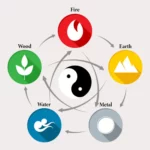The 5 Elements in Chinese Astrology
Chinese astrology, deeply rooted in the philosophy of Taoism, offers a rich tapestry of symbolism and wisdom, guiding individuals on their life journeys. Central to this ancient art is the concept of the Five Elements, also known as Wu Xing. These elements—Wood, Fire, Earth, Metal, and Water—form the cornerstone of Chinese metaphysics, influencing everything from personality traits to societal dynamics and even environmental patterns. Let’s delve into the profound significance of the Five Elements in Chinese astrology.
The Philosophy of Wu Xing
At the heart of Chinese astrology lies the belief that the universe is governed by a harmonious interplay of opposing forces. This concept is encapsulated in the philosophy of Yin and Yang, where Yin represents darkness, passivity, and femininity, while Yang embodies light, activity, and masculinity. The Five Elements further elucidate this dynamic equilibrium, illustrating how various energies interact and transform within the cosmos.
Wood (Mu): Symbolizing growth, vitality, and flexibility, Wood is associated with springtime and the dawn of life. Those influenced by Wood are often ambitious, creative, and adaptable, akin to the resilient nature of trees bending with the wind.
Fire (Huo): Reflecting passion, energy, and transformation, Fire embodies the warmth of summer and the intensity of flames. Fire personalities are charismatic, dynamic, and often possess a fiery spirit that drives them towards their goals.
Earth (Tu): Grounded and nurturing, Earth represents stability, fertility, and nourishment, akin to the fertile soil that sustains life. Individuals influenced by Earth are pragmatic, reliable, and deeply connected to their roots and community.
Metal (Jin): Symbolizing strength, clarity, and precision, Metal embodies the sharpness of autumn and the refinement of craftsmanship. Those under the influence of Metal are often disciplined, analytical, and possess a keen eye for detail.
Water (Shui): Flowing and adaptive, Water represents wisdom, intuition, and introspection, akin to the depths of the ocean and the serenity of still ponds. Water personalities are often insightful, intuitive, and possess a deep emotional intelligence.
Interplay and Balance
In Chinese astrology, each individual is believed to possess a unique elemental composition based on their birth year, month, day, and hour. These elements interact dynamically, shaping one’s personality, relationships, and destiny. The interactions between the elements are governed by a cyclical pattern known as the Generating Cycle and the Controlling Cycle.
Generating Cycle: In this cycle, each element generates or creates another, fostering growth and harmony. For example, Wood feeds Fire, Fire creates Earth (ashes), Earth bears Metal, Metal carries Water (as a container), and Water nourishes Wood.
Controlling Cycle: Conversely, each element also exerts control or dominance over another, ensuring balance and preventing excess. For instance, Wood can control Earth by penetrating it with roots, Earth can absorb Water, Water extinguishes Fire, Fire melts Metal, and Metal chops Wood.
Practical Applications
The insights provided by the Five Elements extend beyond individual horoscopes to encompass diverse aspects of life, including health, relationships, and even interior design. By understanding one’s elemental composition, individuals can harness the strengths of their dominant elements while mitigating potential challenges posed by imbalances.
Conclusion
The Five Elements in Chinese astrology offer a profound framework for understanding the complexities of the universe and our place within it. Through their dynamic interplay, these elements illuminate the essence of our personalities, relationships, and destinies. By embracing the wisdom of Wu Xing, we can navigate life’s ebbs and flows with greater insight, harmony, and balance.
